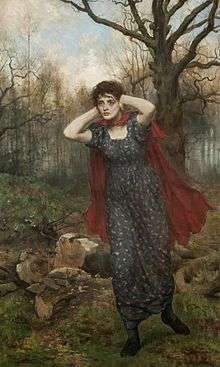Hetty Sorrel
Hetty Sorrel is a major character in George Eliot's novel Adam Bede (1859).

Beautiful but thoughtless Hetty lives in the fictional community of Hayslope — a rural, pastoral and close-knit community in 1799. Her home is on Mr. Martin Poyser's dairy farm as she is his niece. Because she is an extremely pretty girl, she is admired by Mr. Craig and Adam Bede as well as Captain Arthur Donnithorne. Aside from her great physical beauty, George Eliot takes care to make it clear that she does not have many attractive personal qualities. She is spoiled, cold, insensitive, indifferent to other people's problems, and almost comically vain and selfish.
Hetty is a cousin by marriage of Dinah Morris, a fervent Methodist lay preacher. In contrast to Hetty, Dinah is depicted as completely pure, generous, unselfish, modest, and unfailingly compassionate.
The novel revolves around a love triangle between vain and pleasure-loving Hetty Sorrel, Captain Arthur Donnithorne, the young squire who seduces her, Adam Bede, her unacknowledged lover, and Dinah Morris.
Adam is in love with Hetty. Though she is only a milkmaid, Hetty secretly longs for the luxurious life of an upper class lady. She is attracted to Captain Donnithorne and soon falls in love with him. When Adam interrupts a tryst between them, Adam and Arthur fight. Arthur leaves Hayslop to return to his militia. Broken-hearted, she agrees to marry Adam but shortly before their marriage, discovers she is pregnant, and having second thoughts, leaves in search of Arthur. She cannot find Arthur, and unwilling to return to the village and shame her family, she delivers her baby anonymously. She kills the child by abandoning it in a field, where it dies of exposure.
Hetty is caught and tried for child murder. She is found guilty and sentenced to hang. When Arthur Donnithorne, on leave from the militia for his grandfather's funeral, hears of her impending execution, he races to the court and has the sentence commuted to transportation.
According to The Oxford Companion to English Literature (1967),
- "the plot [of Adam Bede] is founded on a story told to George Eliot by her aunt Elizabeth Evans, a Methodist preacher, and the original of Dinah Morris of the novel, of a confession of child-murder, made to her by a girl in prison."